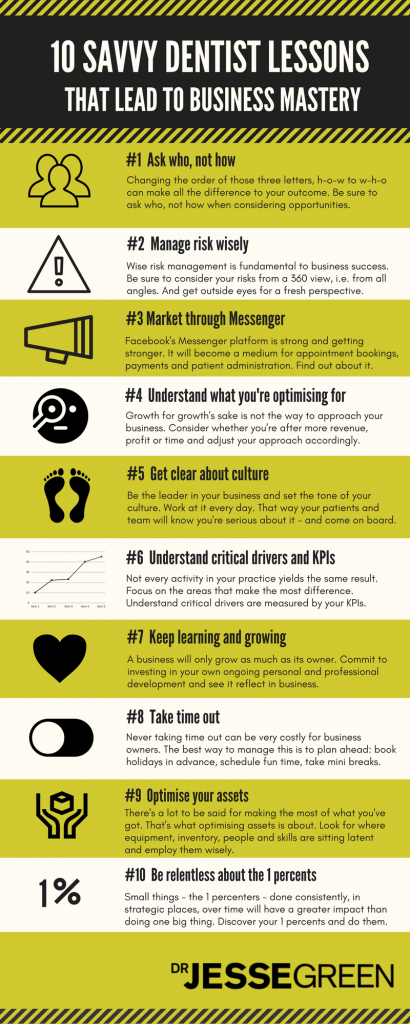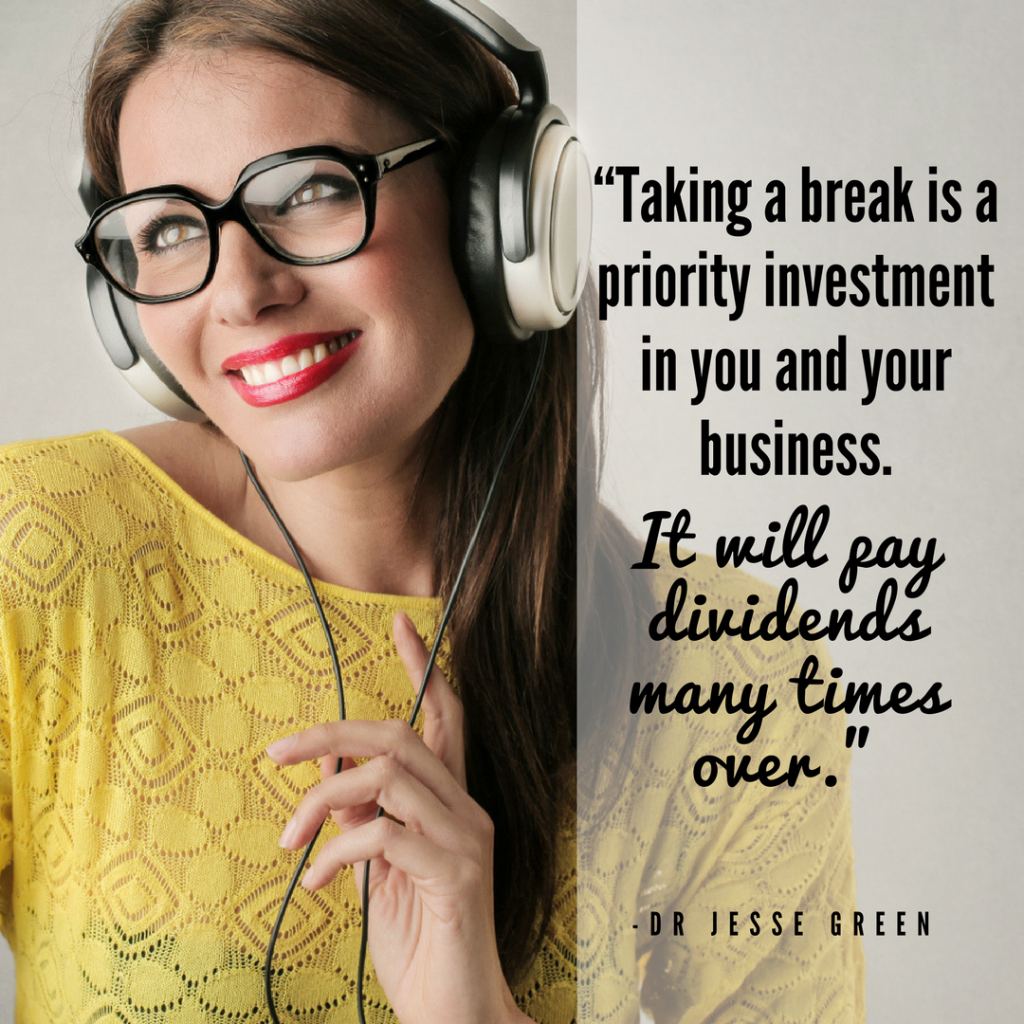Dental business is not always easy.
In fact, some days it’s tough. On those days the human comes out in us all. We look for silver bullets and magic wands.
Sadly, these don’t exist.
Except in Clint Eastwood westerns and Harry Potter books.
Dental business mastery is more a case of fundamentals over flair.
And that’s a good thing.
It means mastery is not the domain of an elite few.
Rather, any dentist can learn the lessons that lead to dental business mastery.
Backed by a healthy dose of application and inspiration, you’ll find yourself on a good thing that just gets better.
This year I’ve had my own lessons and I’m sharing them here.
Without a doubt, some have been easier than others. All have been invaluable.
As we stare down 2017, now is the perfect time to reflect and consider your own lessons and how you’ll integrate them to make next year your best yet.

#1 Ask Who, Not How
It was a real buzz to meet Sir Richard Branson on Necker Island this year.
Yes, he’s an icon, but it was more than just being in his space.
As an iconically successful businessman, he definitely knows his stuff.
Now it’s no secret I’m a fan of asking quality questions, but he shared insight that’s tweaked my approach to opportunities.
He asks who, not how.
It’s such a simple thing – flipping the order of the letters in the word ‘how’ – but the possibilities it opens up can make all the difference to your business outcome.
A valuable lesson for me, when opportunities arise, now I’m asking who, not how.
#2 Manage Risk Wisely
For the most part, dentists are inherently conservative when it comes to risk.
A quality trait in patient care, I’ve noticed the ball sometimes gets dropped when it comes to dental business. Enthusiasm for the next big thing takes over.
Enthusiasm is good, but managing risk wisely is pivotal to great business development.
When risk is wisely managed, we’ve accounted for things like our business blindspots. We’re also clear about operating assumptions. We’ve challenged the status quo, asking “Is there a better way?”
Wise risk management means honest, 360 degree appraisals of your dental business.
Best done with objective eyes, wise risk management can also mean bringing in an external help to ensure you’ve covered all bases.
#3 Market Through Messenger
Change is inevitable, especially in Facebook’s world.
An emerging trend from 2017 is the use of marketing through the Facebook Messenger platform. Expect it to continue in 2018 as the functionality of this platform keeps growing.
Think appointment bookings, payments, and virtual computer assistants – or Bots – that attend to the mundane.
Be ready to shift your marketing up a gear with Messenger in the very near future.
#4 Understand What You’re Optimising For
Through marketing, media and mindset, we’re conditioned to believe bigger is better. But is it really?
Growth purely for the sake of growth does not equate to business mastery, or even a better business.
The question you need to ask here is: what am I optimising my business for?
Your response is personal and it could be anything: more revenue, more gross profit, more time.
Once you know what you’re optimising your dental business for, just about everything else falls into place.
#5 Get Clear About Culture
In your dental business you’re the leader.
I’m kind of stating the obvious, I know, but when it comes to culture, it means you set the tone.
As business leaders, our role is to create a world class culture in our practice. We do this for our patients, our team, and ourselves.
Easier said than done, a world class culture takes consistent work and finding A-class people.
It also requires values are communicated consistently.
Culture is the kind of thing that’s done day in, day out. No exceptions.
It’s visible in your actions and it’s heard in your words.
Take your culture seriously and your team will learn to as well.
#6 Understand Critical Drivers and Key Performance Indicators (KPI)
Not all activities in dental practice are created equal.
To scale and grow, it’s necessary to accord the greatest importance to those things that move the dial most.
While being busy might feel good, closer analysis of your busy-ness may find it’s not best for business.
The greatest effectiveness in business is reached when energy and efforts are directed at activities that generate desirable results. These are your critical drivers.
Your KPIs track how well you doing against your critical drivers.
Let’s say your KPI is new patients. One critical driver would be asking for referrals.
The critical driver (asking for referrals) informs your KPI (the number of new patients).
#7 Keep Learning and Growing
A dental business will never outgrow it’s leader.
If we want our business to grow, we must grow too.
In practice, this means a commitment to continued learning and development.
Equally important for both the personal and professional aspects of life, I recommend you put together a development plan for 2018.
What skills are needed to move your business forward over the next twelve months?
What personal attributes do you need to develop?
Identify the gaps and then close them with a learning and growth plan that you implement.
#8 Take Time Out
A dangerous trap with business ownership is never taking time out.
All high performers, like elite athletes and successful entrepreneurs, know the value and necessity of taking time to reflect and replenish.
In fact, this is what allows them to sharpen their performance.
We’ve all heard the story of the two woodchoppers, right?
One woodchopper gets his axe and starts swinging furiously at the tree.
The second woodchopper doesn’t start chopping immediately. Instead, he takes time to sharpen his axe.
Despite starting well after the first guy, he chops the tree down much faster in the end.
Time out is vital.
Book holidays in advance. Plan your fun. Take mini breaks. Then both you and your business will flourish.
#9 Optimise Your Assets
Sometimes tangible value – our assets – is staring us in the face, and we don’t realise it.
Assets take many forms, but it’s just smart business to make the most of everything in your practice.
Look for where you can extract more value from your equipment, inventory, patient database, team and skills.
Having worked with hundreds of practice owners, the chances are you have close to everything you need to create the practice of your dreams.
#10 Be Relentless About the 1 Percents
Growth and development is not linear. And it does not happen overnight.
Actually, it usually happens in tiny increments – the 1 percents or fundamentals.
When Stephen Bradley spoke at our recent workshop, he honed in on this concept.
He became a gold medal Olympian by focusing on the 1 percenters.
These things done consistently, over time, in strategic areas, are what lead to business mastery.
Excellence is doing the fundamentals really well.
Rather than thinking you’ve got to be a rock star, be relentless about the 1 percents.
Final words…
One of the great things about business is there’s always something to learn.
As the year wraps up, be sure to reflect on your own lessons.
Take time to integrate them and you’ll have the best chance of rocking it in 2018.















